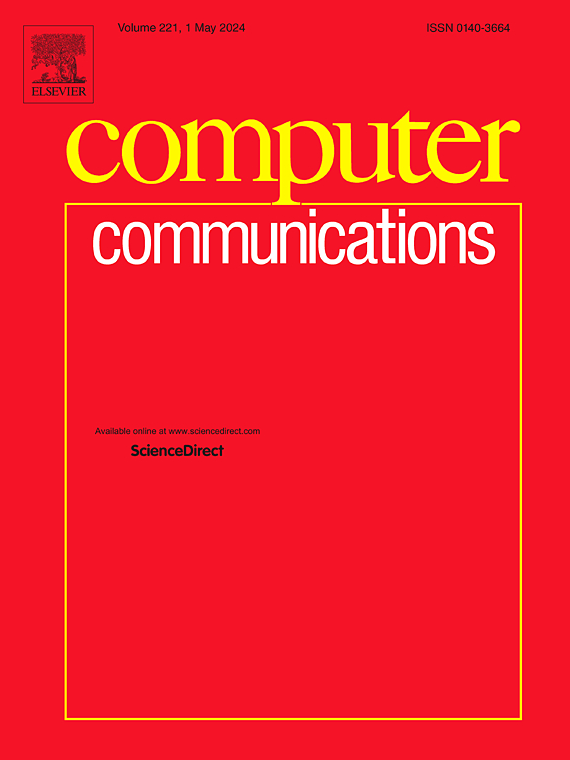Multi-agent deep reinforcement learning-based partial offloading and resource allocation in vehicular edge computing networks
IF 4.5
3区 计算机科学
Q1 COMPUTER SCIENCE, INFORMATION SYSTEMS
引用次数: 0
Abstract
The advancement of intelligent transportation systems and the increase in vehicle density have led to a need for more efficient computation offloading in vehicular edge computing networks (VECNs). However, traditional approaches are unable to meet the service demand of each vehicle due to limited resources and overload. Therefore, in this paper, we aim to minimize the long-term computation overhead (including delay and energy consumption) of vehicles. First, we propose combining the computational resources of local vehicles, idle vehicles, and roadside units (RSUs) to formulate a computation offloading strategy and resource allocation scheme based on multi-agent deep reinforcement learning (MADRL), which optimizes the dual offloading decisions for both total and residual tasks as well as system resource allocation for each vehicle. Furthermore, due to the high mobility of vehicles, we propose a task migration strategy (TMS) algorithm based on communication distance and vehicle movement speed to avoid failure of computation result delivery when a vehicle moves out of the communication range of an RSU service node. Finally, we formulate the computation offloading problem for vehicles as a Markov game process and design a Partial Offloading and Resource Allocation algorithm based on the collaborative Multi-Agent Twin Delayed Deep Deterministic Policy Gradient (PORA-MATD3). PORA-MATD3 optimizes the offloading decisions and resource allocation for each vehicle through a centralized training and distributed execution approach. Simulation results demonstrate that PORA-MATD3 significantly reduces the computational overhead of each vehicle compared to other baseline algorithms in VECN scenarios.
基于多智能体深度强化学习的车辆边缘计算网络部分卸载与资源分配
智能交通系统的发展和车辆密度的增加导致了对车辆边缘计算网络(vecn)中更有效的计算卸载的需求。然而,由于资源有限和超载,传统的方法无法满足每辆车的服务需求。因此,在本文中,我们的目标是最小化车辆的长期计算开销(包括延迟和能耗)。首先,我们提出结合本地车辆、闲置车辆和路边单元(rsu)的计算资源,制定基于多智能体深度强化学习(MADRL)的计算卸载策略和资源分配方案,优化了总任务和剩余任务的双重卸载决策以及每辆车的系统资源分配。此外,针对车辆的高机动性,提出了一种基于通信距离和车辆移动速度的任务迁移策略(TMS)算法,以避免车辆移动到RSU服务节点通信范围之外时计算结果传递失败。最后,我们将车辆的计算卸载问题表述为一个马尔可夫博弈过程,并设计了一种基于协作多智能体双延迟深度确定性策略梯度(PORA-MATD3)的部分卸载和资源分配算法。PORA-MATD3通过集中训练和分布式执行方法,优化每辆车的卸载决策和资源分配。仿真结果表明,在VECN场景下,与其他基线算法相比,PORA-MATD3显著降低了每辆车的计算开销。
本文章由计算机程序翻译,如有差异,请以英文原文为准。
求助全文
约1分钟内获得全文
求助全文
来源期刊

Computer Communications
工程技术-电信学
CiteScore
14.10
自引率
5.00%
发文量
397
审稿时长
66 days
期刊介绍:
Computer and Communications networks are key infrastructures of the information society with high socio-economic value as they contribute to the correct operations of many critical services (from healthcare to finance and transportation). Internet is the core of today''s computer-communication infrastructures. This has transformed the Internet, from a robust network for data transfer between computers, to a global, content-rich, communication and information system where contents are increasingly generated by the users, and distributed according to human social relations. Next-generation network technologies, architectures and protocols are therefore required to overcome the limitations of the legacy Internet and add new capabilities and services. The future Internet should be ubiquitous, secure, resilient, and closer to human communication paradigms.
Computer Communications is a peer-reviewed international journal that publishes high-quality scientific articles (both theory and practice) and survey papers covering all aspects of future computer communication networks (on all layers, except the physical layer), with a special attention to the evolution of the Internet architecture, protocols, services, and applications.
 求助内容:
求助内容: 应助结果提醒方式:
应助结果提醒方式:


